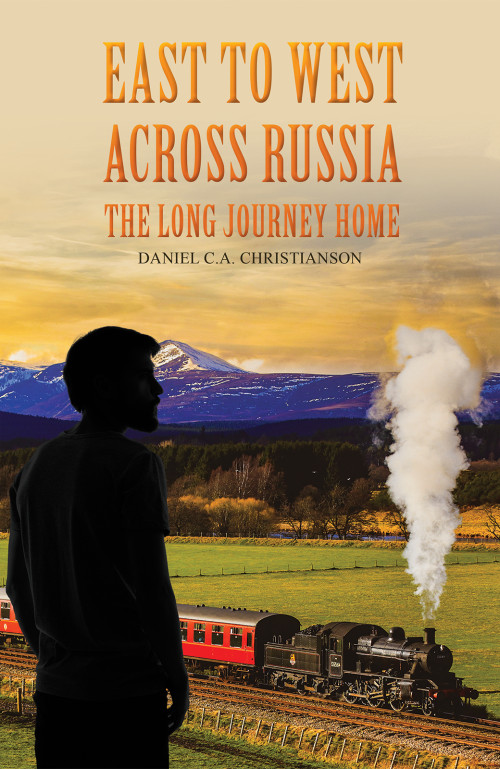
*Available directly from our distributors, click the Available On tab below

He is a man of solitude. His world is that of the quiet and distilled. Each night, he sits at his desk as the clock strikes midnight. He journeys inward to that bottomless pit of conflict, prompted by memory, in search of an image fused with the imagination in order to reveal truth through character and the creative narrative process. The words become sentences and they are formed. And so it all begins. This was his first attempt and successful completion of a full-length book. His name is Daniel C.A. Christianson.
This read is two journeys taken at the same time by the same man. One takes us with him to fascinating places that few of us will see for ourselves. The other is to a place that only he knows. We are honoured to be part of both.
Before I ever go out and purchase a book I always spend time observing and researching book covers as I find that so much of the story is subtly contained on the front and back covers of the book. The front and back cover of this book really stood out to me. The colors are so warm and striking; they ooze a sophistication that draws a reader in. I like how the silhouette of the main character on the front cover is positioned outside of the train whilst at the same time he is very much rooted to the natural landscape that surrounds him. There is a nostalgia back to the past and to the world of the 19th and 20th centuries with the age of steam locomotive at the height of its gilded power. The amber and golden brown of the sun's setting contrasts beautifully with the deep blue of the mountainous terrain that surrounds the environment. The depth of the in between dark forest coverings fits the scene so well with the pastoral green hue of the foreground. Everything seems to be in their natural place except for that of the main character. He looks to be transparent even though he is rooted to the soil of the earth. That is just the first impression I have made upon looking at the book and holding it in my hand. I am yet to turn inside and read the words of the author but the quality of the book cover really stands out and demanded my attention.
I sense at the core of this book is a Christian message of Love over hate and Light over darkness. The author never explicitly addressed the God of Christianity in the long monologue scene at lake baikal but it is obvious from close reading that Christianson is calling out for a higher meaning in this world filled with evil and injustice. Christianson highlights a never-ending reel of excess and crime committed by humanity onto humanity. He never points the blame onto an omniscient God but rather shows the only guilty entity that could have caused such catastrophic plundering and war and that entity is all of us human beings. Christianson is not afraid to speak his mind and show how we as a human species continue to fall but he still believes that there is hope for us but only if we acknowledge our past and look to make amends for such crimes going into the future. The 20th century is the one that Christianson believes that brought an entire new and potent level of depravity from the slaughtering of men on the battlefields of Europe, from the efforts to erase the Jewish people during the Holocaust and finally to the revolting crimes that were inflicted onto the former Yugoslavia during the Balkans war during the final days of the century. The love interest from D to N is a timely reminder during all of this deep introspection that there is nothing more important in this world than Love. D lost this great love of his but perhaps N is a metaphor and symbolic of the loss of love that exists throughout our world where man continues to fight and continues to destroy one another.
I am very happy that I read this book because I usually do not read travel books in general but this book is very different from other travel narratives. The fictional narratives aspect of the story is a crucial one as it takes the story away from the train carriages and out into the world of the past, present and future. The author through his protagonist is dealing with deep internal issues that he begins to address at lake baikal. I never heard of this lake before but now I know that it is the largest freshwater lake in the world and a cradle of exquisite setting and life. I cannot determine whether this lost love N is real or fictional. There are moments when I feel that she is a real person and living somewhere in the world but then at other moments I sense that she has been conjured up within the soul of the author to enhance the movement and meaning of the narrative. The story builds with the protagonist's thoughts and memories of N. She is or was the great love of his life but now he has to move forward with his life without her just like how the train is moving forward from one location to the next.
Ultimately, this is not a mere travel book. It consists of not just the details and descriptions of a train journey but of a series of insightful musings and meditations on life, art and history. Christianson begins his work with a statement of his passion for trains from an early age. The African-American spirituals and culture see the train as a metaphor for the coming of God's kingdom, always imminent, always coming around the bend. In literature, stretching back to antiquity and classical Homeric times, life was linked to a physical journey- Ulysses' odyssey home to Ithaca coinciding with our spiritual journey of life towards the eternal. As Augustin said, 'our hearts are restless until they rest in thee.' This train journey is a transformative one for Christianson. The man who finishes the journey is a different man from the one who began it. A vital aspect of this book are the people and characters Christianson encounters on his travels. Like the pilgrimage of Chaucer's Canterbury Tales, these people are of all types and dispositions- rogues, villains, heroes and saints. In some sense, they are the engine pulling the train as we read. This is a journey all of us can identify with and recognize as our own.
I came upon this book by accident in Europe recently but how happy I was that I got to read the words of this very mysterious but deeply compassionate author. At the heart of this book is a young boy who never grew up and whilst he has matured into the introspective protagonist that is placed in front of us I feel that the young boy who loved trains when he was nine years old is essentially the same boy who is slowly revealed to us readers. I do think the character of N is real. This is very obvious as the young boy who he once was is now tortured as a man trying to live each day without this secretive woman named N. Only a love that is so real and broken from love could be written with such longing, regret and genuine feeling when living in the present but desperately trying to return to the past and to his love N. Who knows what happened between D and N. Perhaps D broke her heart and as a result she departed his life and their love. Perhaps N wanted to be free and live a life that is one filled with her own artistic expression and the endless longing of her muse would not be compatible with such an existence. Whatever the truth, D has now immortalized his great love N forever so that she is no longer living in the past as a regretful memory but one who will continue to live in the present when readers will cast their own shadow upon her. I thoroughly recommend this book as the experience that you think you might have upon looking at the cover will dramatically change when you are brought into the existential mind of the protagonist.
I think every generation sees and experiences a writer come along who becomes a voice for that generation. In this early part of the 21st century I sense Christianson could be the author who speaks to our generation. I really enjoyed this little book. I don't think it is about trains or train travel at all. That is the guise of its subtly that the reader is brought on a travel experience across the world's largest country when in truth it is an internal journey that is the one that is most accurate to the human experience. There is a real depth to the narrative that the author reveals along his canvas and the protagonist is used to show such a journey for the individual along our own unique journey through life. The author is not afraid to be critical of our modern word and what we have inherited from previous generations. He looks on us as a fallen but deeply soulful people who could and must become better than what we have shown thus far through our life's journey. The protagonist is a deeply introspective and sensitive person who wants to move onward but is plagued by the memories of his past and a love that brought ultimate meaning to his life. I don't see the character of N as a real person either but N becomes the universal symbolism of love lost and the inability of the human being to move on from such a lost love. The character D sees his lost love N everywhere but he can never again reach her and that is the tragedy of such a story. I recommend this book to anybody who loves being brought into a story but who will be shown a mirror into their own lives from which they cannot ignore.
The author, narrator and protagonist remind me of somebody but I am not sure who this person or persons is. There is a deep shadow that hangs over the novel as if it was deliberately cast by the author himself. I read it once straight through as I usually do with most books I read and then I read it a second time but this time I reflected and pondered on the many passages that were placed in front of me. Such passages often hold up a mirror to my own life and the many insecurities that exist within me. The protagonist is a deeply introspective individual. He seeks a different and alternative life and one that is away from the everyday monotony and absurdities of our world. I also question whether this character of N is real or whether she is an imaginary figure like a ghost always there but also very elusive. The protagonist writes about her as not only the love of his life but somebody heavenly that he tried to love and hold onto but in the end she faded away from his life and all that meaning and love he has for her is gone forever. I found it very sad but never depressing and I felt hope resonating from the pen of the author.
We use cookies on this site to enhance your user experience and for marketing purposes.
By clicking any link on this page you are giving your consent for us to set cookies